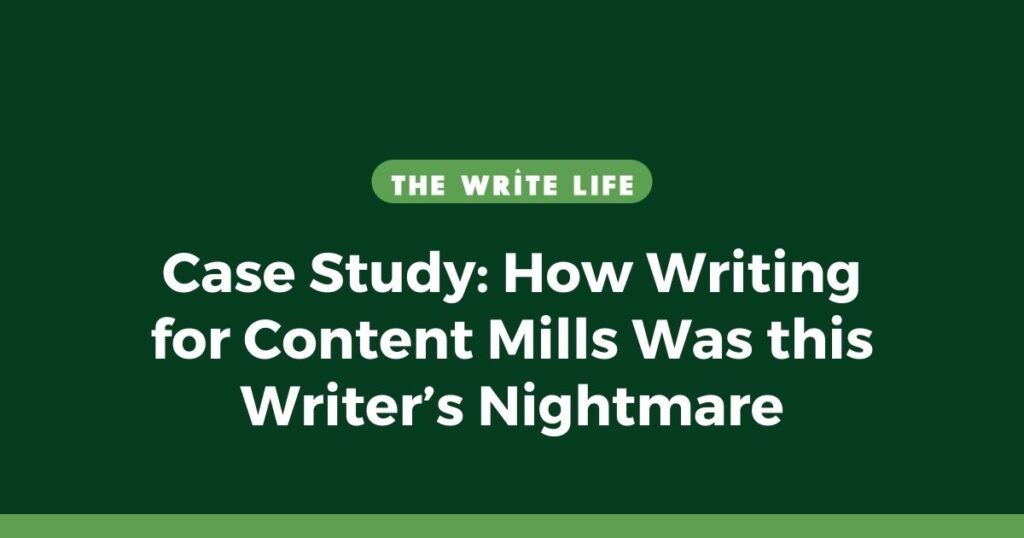Are you currently writing for content mills or considering writing for a content mill? Before you sign up please read this first-person case study from writer Adryan Corcione to help aid in your decision.
Main Points About Writing for Content Mills

A few years back, I was planning baby steps to transition towards full-time freelance writing. At the time, I was working a monotonous day job in real estate content marketing and freelance writing on the side on weeknights and weekends.
My quest for anchor clients
My main strategy was securing a handful of anchor clients—or “businesses or individuals with whom you have an ongoing relationship and a steady flow of projects and income,” according to Funds for Writers—to help cover basic living expenses: food, rent, utilities, etc.
Freelance writers also use the terms “anchor gigs” and “bread and butter gigs” to refer to anchor clients.
This strategy is how I ended up writing for a content mill—and totally failed at it.
I won’t say which site it was, but it’s sort of like the Huffington Post (because they don’t pay their writers) and aimed mostly at college students.
Although this was a publication and not Upwork, I still refer to it as a content mill because of its embarrassingly low wages, which are all-too-common when you’re writing for content mills.

My nightmare of a story writing for content mills
I came across a listing in a writer’s Facebook Group for a copyediting opportunity.
After sending off my resume and some writing samples, I quickly received an eager reply to talk about my professional experience over the phone. I was thrilled, not only because of the possibility of securing an anchor client, but finally getting some copyediting experience under my belt.
Plus, this was happening in an exclusive writer’s circle, so it seemed like a great opportunity to hop on board with.
When I asked about payment during my initial phone interview, the interviewer said copyeditors earn $1 for every article they submit. To make a “fair” wage of $10 an hour, we were expected to complete at least 10 articles per hour. Shifts were typically between two and four hours, and we’d have multiple a week.
I had a terrible feeling in my gut: $1 per article? That’s nuts, right?
However, I was in an awkward position. I wanted to desperately leave my desk job at the time, and I needed anchor gigs I could rely on for a base income—even if it meant writing for content mills. After all, I was looking for experience to carry with me when I applied for higher-paying gigs.
Plus, I was already having a great conversation with this person, especially since they were enthusiastic about my work, and I didn’t know the average rates for copy editing as a novice.
Instead of listening to my gut, I continued with the hiring process.
I attended an hour-long tutorial, but I wasn’t compensated for my time. On top of a low wage, the system was difficult to grasp: lots of documents to fill out, web pages to go through and articles to read. Despite the anxiety I started to feel, I went with the flow and tested it out.
Soon enough, my first shift came along. My anxieties were validated when I struggled to finish copy editing three articles within an hour. I grew incredibly frustrated at myself.
Why did I let myself get this far to mess up? In hindsight, my anger was misdirected at myself and should’ve been at the company for thinking I could actually copy edit 10 articles (accurately) in an hour.
Forget Upwork or Fiverr, I thought, I’m already a screw-up.
Another writer’s experience writing for content mills
Not everyone has the same experience with content mills as I do.
In fact, some writers successfully kicked-off their careers with them and believe they can be a decent starting point for those who want to become a freelance writer.
For example, full-time freelance writer Ana Gotter describes her experience with Upwork as “[having] consistently had more bad experiences than good ones,” but highly recommends a similar site called ClearVoice. She has also heard about positive experiences with Ebyline from other freelance writers.
“I did get my first ghostwriting book contract out of it and even made it into Upwork’s Top Talent and Pro programs, but I left the site after they hiked up the rates that freelancers have to pay. It’s also common for writers to do work for extremely low pay for great reviews early on, but this can end up hurting them.”
If you’re kickstarting your career as a freelance writer, pursuing work through a content mill might not be a terrible idea, but there are some major caveats.
First, you need to be wise about which sites you’re invested your time into.
Gotter explains Clearvoice and Ebyline have better success rates compared to Upwork.
Don’t spend hours creating an extensive profile with recommendations and pursuing projects if the rates are far too low for your income goals. Especially if you’re trying to establish anchor client relationships, don’t dismiss content mills until you try one out for yourself, but know when to walk away once the rates are low.
Secondly, you need to make sure you’re not putting all of your eggs into the content mill basket. Mills should simply be a means to an end.
You should still be working on building up your own base of anchor clients outside of the mills—clients who pay more don’t expect you to churn out dozens of articles every day, and will help you earn what you truly deserve.
Writing for content mills can be a decent way to kick off your freelance career, especially if you’re looking for freelance writing jobs for beginners.
However, it’s easy to overwork yourself in an environment that typically underpays its employees. Too many times, writers get stuck in the rut of writing for pennies in the mills, and they never take the time to build up their own base of clients that pay quality rates.
Needless to say, the consensus of freelancers offer two approaches: run away or proceed with caution if considering content mill jobs.

If you’re wondering what opportunities exist for freelance writers in 2024 (hint: there are plenty!) then make sure to register for the free webinar coming up on September 26, 2024 called How to Successfully Break Into Journalism in 2024! You’ll learn about the different types of journalism and what you may best be suited for, and the top skills successful journalists need and what it can lead to.
This is an updated version of a story that was previously published. We update our posts as often as possible to ensure they’re useful for our readers.